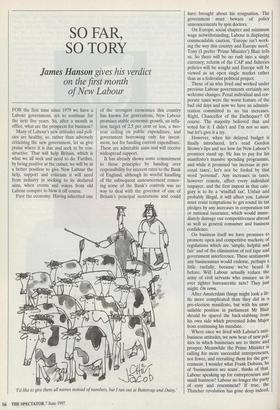SO FAR, SO TORY
James Hanson gives his verdict
on the first month of New Labour
FOR the first time since 1979 we have a Labour government, set to continue for the next five years. So, after a month in office, what are the prospects for business?
Many of Labour's new attitudes and poli- cies are healthy, so, rather than adversely criticising the new government, let us give praise where it is due and seek to be con- structive. That will help Britain, which is what we all seek and need to do. Further, by being positive at the outset, we will be in a better position to give New Labour the help, support and criticism it will need from industry in sticking to its declared aims, when events and voices from old Labour conspire to blow it off course.
First the economy. Having inherited one of the strongest economies this country has known for generations, New Labour promises stable economic growth, an infla- tion target of 2.5 per cent or less, a two- year ceiling on public expenditure, and government borrowing only for invest- ment, not for funding current expenditure. These are admirable aims and will receive widespread support.
It has already shown some commitment to those principles by handing over responsibility for interest rates to the Bank of England, although its woeful handling of the subsequent announcement remov- ing some of the Bank's controls was no way to deal with the governor of one of Britain's principal institutions and could 'I'd like to give them all names instead of numbers, but I ran out at Buttercup and Daisy.' have brought about his resignation. The government must beware of policy announcements by spin doctors.
On Europe, social chapter and minimum wage notwithstanding, Labour is displaying commendable caution. 'Europe isn't work- ing the way this country and Europe need,' Tony (I prefer 'Prime Minister') Blair tells us. So there will be no rush into a single currency; reform of the CAP and fisheries policies will be sought and Europe will be viewed as an open single market rather than as a federalist political project.
Those of us who lived and worked under previous Labour governments certainly see welcome changes. Penal individual and cor- porate taxes were the worst feature of the bad old days and now we have an adminis- tration committed to no tax increases. Right, Chancellor of the Exchequer? Of course. The majority believed that and voted for it. I didn't and I'm not so sure, but let's give it a try.
However, when his delayed budget is finally introduced, let's read Gordon Brown's lips and see how far New Labour's promises stand up. He has to pay for his manifesto's massive spending programme, and while it promised 'no increase in per- sonal taxes', let's not be fooled by that word 'personal'. Any increases in taxes, however remote, affect every individual taxpayer, and the first impost in that cate- gory is to be a 'windfall tax'. Unfair and probably illegal, it will affect you. Labour must resist temptations to get round its tax pledges by any increases in corporation tax or national insurance, which would imme- diately damage our competitiveness abroad as well as general consumer and business confidence.
On business itself we have promises to promote open and competitive markets; of regulations which are 'simple, helpful and fair' and of the elimination of red tape and government interference. These sentiments any businessman would endorse, perhaps a little ruefully, because we've heard it before. Will Labour actually reduce the army of civil servants who ensnare us in ever tighter bureaucratic nets? They just might. On verra.
After Amsterdam things might look a lit- tle more complicated than they did in a pre-election manifesto, but with his unas- sailable position in parliament Mr Blair should be spared the back-stabbing from his own side which prevented John Major from continuing his mandate. Where once we lived with Labour's anti- business attitudes, we now hear of new pol- itics in which businesses are to thrive and prosper. Meanwhile the Prime Minister is calling for more successful entrepreneurs, not fewer, and recruiting them for the gov- ernment. I wonder what Frank Dobson, he of 'businessmen are scum', thinks of that. Labour speaking up for entrepreneurs and small business? Labour no longer the party of envy and resentment? If true, the Thatcher revolution has gone deep indeed, but before we get carried away by the belief that Labour is the favoured political arm of the British people, remember there are still more than nine million Conserva- tive voters.
So far New Labour has kept the trade unions at arm's length, and with his per- sonal popularity and huge parliamentary majority the Prime Minister should be able to keep things that way. In this the inter- ests of New Labour and industry coincide. The last thing they want is to be harnessed once more to the TUC carthorse, although background neighing is beginning to be heard from the stable. Business and the whole country will really benefit if the government succeeds in raising school standards. Tests in basic literacy and numeracy, a return to whole class teaching, the expulsion of the calcu- lator from elementary arithmetic and the closure of failing schools: less than ten years ago advocacy of such things was con- fined to a few brave souls far to Labour's right. This government now appears to have embraced them with a fervour which does make amends for Labour's past atti- tudes on education. Again, strong support for the government must be forthcoming from the opposition and industrial leaders when, sure as night follows day, the back- lash begins from old Labour in the educa- tional establishment.
More good news. Labour today talks of a stakeholder society in which every indi- vidual is seen as having a stake in what goes on but, equally, also has a responsi- bility to do his or her bit. Today renewal of a sense of individual responsibility is long overdue. Over recent decades Labour has introduced and supported measures whose effects have been to encourage sponging on the state and discourage indi- vidual responsibility. At least there is now a willingness to punish offenders, to crack down on benefit fraud, to discourage ille- gitimacy by turning off the social services tap and to start on the long overdue task of reforming the welfare state. We do not know whether any of this will come about, but it is possible that Labour will find it politically expedient to take those tough decisions. If it does, the coun- try and in particular industrial wealth cre- ators will be encouraged. The Tory party realises that New Labour's adoption of so many of its policies is a disguised compli- ment, so it would be churlish not to repay the compliment by giving support as long as Labour continues down the Tory road. Watch this space.
Lord Hanson is chairman of the multi- national Hanson plc.











































































 Previous page
Previous page